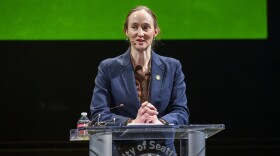You’ve heard of Karl Rove’s Crossroads GPS and other issue advocacy groups that don’t have to disclose their donors. They are transforming American politics.
These political nonprofits also exist at the state level. But much of this activity is coming from the left, not the right. And instead of TV ad campaigns, the work is largely happening online and on the ground.
A Who's-Who Of Washington's Progressive Movement
The tenant list of the Vance Building in downtown Seattle is a type of who’s-who of “progressive nonprofits.” In fact, you might think of this building as the headquarters of the progressive movement in Washington. Up on the third floor of this building, you’ll find the most visible member of this network: an organization called Fuse Washington.
On a recent day, nearly a dozen young staffers were crowded around a table in a cramped conference room. Field director Erin Haick updated the team on one of Fuse’s top priorities this legislative session: passage of the so-called Dream Act to give state college aid to undocumented high school grads. It passed the Washington House with overwhelming bipartisan support on the first day of the session.
“We did a Facebook share on that, got 14,000 views and 121 shares to kind of continue the momentum for the Senate,” Haick said.
The plan is to keep the pressure on Senate Majority Leader Rodney Tom to allow a vote on the Dream Act.
Just outside the door of the conference room is a large photoshopped poster of Tom wearing a jeweled crown. Around here, he’s known as “King Tom,” an unflattering nickname Fuse gave the Democrat last year after he joined with Republicans to form a majority coalition. Even so, executive director Aaron Ostrom insists Fuse is non-partisan.
“We don’t really care what the letter is after somebody’s name, right? We care about their values and their willingness to lead on behalf of ordinary people,” Ostrom said.
A Powerful Campaign That Never Ends
Fuse is a 501(c)(4) “social welfare” organization that doesn’t have to disclose its donors. It’s part of a network of left-of-center nonprofits, most created in the last five to seven years in Washington. They include think tanks, a candidate recruitment and training organization and a bus that goes around to register and mobilize young voters.
Together, these organizations represent a powerful campaign that never ends to make what supporters call “progressive” social and political change in Washington. It’s a network that has the potential to eclipse individual candidates and even the state Democratic Party itself.
“There’s nothing mysterious about this,” said Nick Hanauer, a Seattle venture capitalist and prominent political donor. He was one of the early contributors to what became the Progress Alliance of Washington funded by very successful, even wealthy liberal activists. The Alliance is also housed in the Vance Building.
“It’s simply a group of people who share a vision about the kind of politics we want and the kind of state we want working together to organize those efforts,” Hanauer said.
Over the last eight years, they’ve given about $8 million to seed and support this network of “progressive” nonprofits. Because the Progress Alliance is also a nonprofit, it doesn’t have to disclose its donors, although a few agreed to be named for this story. In addition to Hanauer, they include: environmentalist Maryanne Tagney Jones, education activist Ruth Lipscomb and Brian Arbogast of the Gates Foundation. Hanauer says the Alliance is not using its IRS status as a way to conceal the identity of the funders.
“Until the rules changes — and we’d be very supportive of those rule changes — we’re playing the game by the rules that have been defined,” Hanauer said.
Long-Term Progressive Change
This model of deep-pocketed funders, a network of nonprofits and a goal of long-term “progressive” change started in Colorado in 2004. In fact, there’s a book about it titled “The Blueprint: How the Democrats Won Colorado (and Why Republicans Everywhere Should Care).”
Since then, it’s been replicated in some form in nearly two dozen states. Someone who’s closely watched the rise of this network in Washington is Republican strategist Randy Pepple. He managed gubernatorial candidate Rob McKenna’s 2012 campaign and is quite familiar with Fuse.
“Well, Fuse’s primary responsibility was to be out there attacking Rob McKenna every day, and to try to carry the theme that Rob McKenna was not who he said he was,” Pepple said.
Fuse Washington does have a separate political action committee that does report to Washington’s Public Disclosure Commission. Records show that PAC conducted opposition research on McKenna. Pepple views this network of nonprofits as a permanent Democratic campaign.
“If the public knew what they were doing and how a very small number of very liberal donors are controlling state politics, that would be a cause for concern,” he said.
‘This Is Definitely Not A Wing Of The Democratic Party’
In 2012, Washington voters not only elected Democrat Jay Inslee governor, but also upheld same-sex marriage and legalized marijuana. The voter database that helped make that happen is run by yet another nonprofit “social welfare” group called Win/Win Action.
I asked executive director Dana Laurent: Is this a vast left wing conspiracy to take over the state?
“It’s a vast left wing conspiracy to make people’s lives better,” Laurent said, laughing. “Seriously, you know, all of the organizations that sit around the Win/Win table are non-partisan organizations. So this is definitely not a wing of the Democratic Party.”
But the Democratic Party may soon benefit from Laurent’s experience inside Washington’s progressive network. She’s currently a top contender to become the next chair of the Washington State Democratic Party.








